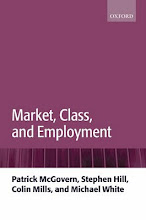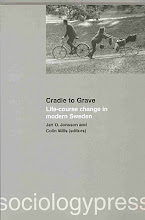I'm surprised by how much interest (judged by page views) there has been in my last post. Especially since I didn't put much effort into explanation or indeed interpretation of the graphs. And I didn't devote any effort at all to answering the $64,000 question which is why we went from a situation in Spring/Summer 2015 in which roughly 40% of the electorate was decidedly pro EU and only 30% decidedly anti to in June 2016 52% of voters opting for Leave?
As I said before, the best evidence on this is going to come from the ESRC's EU Referendum Study which among other things will, I assume, be able to tell us something about change and crystallization of opinion at the individual level in the months leading up to the vote. So you should look out for the stuff coming out from those guys.
What I thought it might be useful to do though is return to the 2015 BES cross-section and explain a little about what went into the measures of support for the EU, concern about immigration, alienation from politics and scepticism about welfare that I used last time round.
To get anywhere you have to simplify, so this is my simplification. BES asks the following questions:
EU:
1) Overall, do you approve or disapprove of Britain's membership in the European Union?
2) If there was referendum on Britain's membership of the European Union, how do you think you would vote? Would you vote to leave the EU or to stay in?
3) Which of these comes closet to your own views? Britain should: - respondent should choose a position from an 11 point scale anchored at one end by the statement ' Do all it can to unite fully with the European Union' and at the other by 'Do all it can to protect its independence from the European Union'.
Immigration:
4) Do you think that too many immigrants have been let into the country, or not? How strongly do you feel about this?
5) Do you think immigration is good or bad for Britain's economy?
6) As far as your concerned what is the single most important issue facing the country at the present time? An open ended question from which I pick out all those who mention immigration. The latter are 35% of those that mention an issue. Immigration roughly 3 times more likely to be picked out than any other single issue.
Alienation:
I'd like to read a few statements about public life. Using an answer from this card, please tell me how strongly you agree or disagree with each of them.
7) Politicians don't care what people like me think.
8) People like me have no say in what government does.
9) Politicians ignore the issues I really care about.
Welfare:
How much do you agree or disagree with the following statements?
10) If welfare benefits weren't so generous people would learn to stand on their own two feet.
11) The welfare state encourages people to stop helping each other.
12) Many people who get social security don't really deserve any help.
This is my raw material. In most cases I chunk up the answers into three groups, putting, where it makes sense, the don't knows in the same groups as the neither agree nor disagrees. Measure 3) (in the EU group) naturally only has two categories - you either mention or don't mention immigration. Measure 4) in the immigration group has four categories since I distinguish between those who strongly and less strongly believe that there has been too much immigration.
If you assume that the answers people give to these questions reveal their latent underlying attitudinal disposition then you can construct a statistical model for the responses that recovers the underlying attitudinal groups that people belong to. So I estimate a latent class model for each of the four sets of items. In each case I recover 3 groups:
1) Pro EU; ambivalent towards the EU; anti EU.
2) Positive about immigration; ambivalent about immigration; negative and strongly concerned about immigration.
3) Believing that politics and politicians reflect their views; ambivalent about politics and politicians; alienated from politics and politicians;
4) Supportive of welfare; ambivalent about welfare; negative about welfare and the people that receive it.
What happens when you look at the world in this way is illustrated below (click to enlarge).
EU:
1) Overall, do you approve or disapprove of Britain's membership in the European Union?
2) If there was referendum on Britain's membership of the European Union, how do you think you would vote? Would you vote to leave the EU or to stay in?
3) Which of these comes closet to your own views? Britain should: - respondent should choose a position from an 11 point scale anchored at one end by the statement ' Do all it can to unite fully with the European Union' and at the other by 'Do all it can to protect its independence from the European Union'.
Immigration:
4) Do you think that too many immigrants have been let into the country, or not? How strongly do you feel about this?
5) Do you think immigration is good or bad for Britain's economy?
6) As far as your concerned what is the single most important issue facing the country at the present time? An open ended question from which I pick out all those who mention immigration. The latter are 35% of those that mention an issue. Immigration roughly 3 times more likely to be picked out than any other single issue.
Alienation:
I'd like to read a few statements about public life. Using an answer from this card, please tell me how strongly you agree or disagree with each of them.
7) Politicians don't care what people like me think.
8) People like me have no say in what government does.
9) Politicians ignore the issues I really care about.
Welfare:
How much do you agree or disagree with the following statements?
10) If welfare benefits weren't so generous people would learn to stand on their own two feet.
11) The welfare state encourages people to stop helping each other.
12) Many people who get social security don't really deserve any help.
This is my raw material. In most cases I chunk up the answers into three groups, putting, where it makes sense, the don't knows in the same groups as the neither agree nor disagrees. Measure 3) (in the EU group) naturally only has two categories - you either mention or don't mention immigration. Measure 4) in the immigration group has four categories since I distinguish between those who strongly and less strongly believe that there has been too much immigration.
If you assume that the answers people give to these questions reveal their latent underlying attitudinal disposition then you can construct a statistical model for the responses that recovers the underlying attitudinal groups that people belong to. So I estimate a latent class model for each of the four sets of items. In each case I recover 3 groups:
1) Pro EU; ambivalent towards the EU; anti EU.
2) Positive about immigration; ambivalent about immigration; negative and strongly concerned about immigration.
3) Believing that politics and politicians reflect their views; ambivalent about politics and politicians; alienated from politics and politicians;
4) Supportive of welfare; ambivalent about welfare; negative about welfare and the people that receive it.
What happens when you look at the world in this way is illustrated below (click to enlarge).
A number of things strike me about these numbers. Firstly, the 10 percentage point difference between those who were positive & those who were negative about the EU is nothing compared to the potential for swaying the almost one-third who were ambivalent. There was lots of potential for the campaign to draw voters to one side or the other.
But now look at the scale of the persuasion job the Remain side had to do. Forty-five percent of the electorate strongly believed that immigration was a major problem and a further third were ambivalent which actually meant they thought it was a concern but expressed their views a little less strongly than the diehards. More than half of the electorate felt alienated from politics and politicians, meaning, among other things, that they felt ignored and that their views (which presumably included their views about immigration) were not of concern to the political elite. Finally just under a half had negative views about welfare and somehow felt that it wasn't going to the right people.
As my last post showed, concerns about immigration, alienation from politics and negative views about welfare are predictive of taking a negative view about the EU. In fact they are all part of the same ideological syndrome. It's clear why the Leavers campaigned the way they did. Already in 2015 it should have been obvious that a populist, anti-immigration, anti-elite, pro" hard-working families" campaign would be very appealing. It didn't take great political skill to link all these things together. The audience already believed it. All that was needed were the populists who were willing to exploit it and a Remain campaign that confirmed its elite and 'out of touch' image by trying to avoid mentioning those particular inconvenient facts. The Leavers also, of course, ignored many other sorts of inconvenient facts, but these were not the ones the punters cared about. Ideologically they had an incumbent advantage.











No comments:
Post a Comment